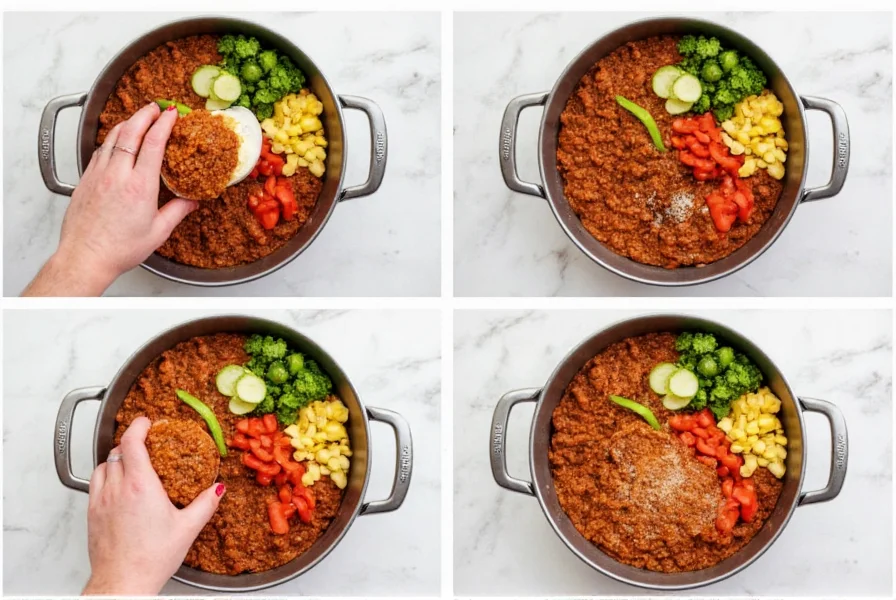Understanding the calorie content of chili bowls helps make informed dietary choices without sacrificing flavor. Whether you're meal prepping, tracking macros, or simply curious about nutritional values, knowing what goes into your bowl matters. This guide breaks down the factors affecting chili bowl calories and provides practical tips for enjoying this hearty meal within your dietary goals.
What Determines Chili Bowl Calorie Count?
Several key ingredients significantly impact the total calories in your chili bowl. The base components—meat, beans, tomatoes, and spices—form the foundation, but additions can dramatically change the nutritional profile.
| Ingredient | Calories per 100g | Impact on Total |
|---|---|---|
| Ground beef (80% lean) | 254 | +++ High impact |
| Lean ground turkey | 135 | ++ Moderate impact |
| Black beans (canned) | 90 | + Low impact |
| Cheese topping (1 oz) | 110 | +++ High impact |
| Sour cream (2 tbsp) | 50 | ++ Moderate impact |
Nutritional Breakdown Beyond Calories
While calorie count matters, chili bowls offer valuable nutrients that contribute to a balanced diet. A standard beef chili bowl provides:
- Protein: 15-20g per serving (supports muscle maintenance)
- Fiber: 8-12g (from beans and vegetables, aids digestion)
- Iron: 20-30% of daily value (essential for blood health)
- Vitamin C: From tomatoes and peppers (boosts immunity)
Vegetarian chili bowls often contain higher fiber content while maintaining substantial protein from beans and legumes. The complex carbohydrates in beans provide sustained energy release, making chili an excellent choice for active individuals.
Restaurant vs. Homemade: Calorie Comparison
Restaurant chili bowls frequently contain more calories than homemade versions due to larger portions and added fats. A typical restaurant serving (16-24oz) can range from 400-800 calories depending on toppings.
When preparing chili at home, you control the ingredients. Using lean meats, increasing vegetable content, and choosing low-fat toppings creates a satisfying meal under 300 calories. For those tracking calories in homemade chili bowl preparations, measuring ingredients ensures accurate nutritional calculations.
Adapting Chili Bowls for Specific Diets
Different dietary approaches require specific modifications to traditional chili recipes:
Low-Calorie Chili Bowl Options
For those seeking low calorie chili bowl options, consider these adjustments:
- Replace half the meat with mushrooms or extra beans
- Use lean ground turkey instead of beef
- Add zucchini, carrots, or bell peppers for volume without significant calories
- Choose Greek yogurt instead of sour cream
- Limit cheese to 1 tablespoon per serving
Keto-Friendly Adaptations
Keto dieters should focus on high protein chili bowl nutrition while minimizing beans:
- Use extra meat and healthy fats like avocado
- Replace beans with cauliflower rice
- Add olive oil or avocado oil during cooking
- Choose full-fat dairy toppings

Common Misconceptions About Chili and Calories
Several myths persist about chili nutrition. Understanding truth about chili bowl calories helps make better choices:
- Myth: All chili is high in calories Fact: Bean-based vegetarian chili can be under 200 calories per serving
- Myth: Chili lacks nutritional value Fact: Rich in protein, fiber, and essential vitamins when properly prepared
- Myth: Restaurant chili is always unhealthy Fact: Many establishments now offer lighter versions with nutrition information
Practical Tips for Calorie-Conscious Chili Lovers
Enjoying chili while managing calorie intake doesn't mean sacrificing flavor. These strategies help maintain healthy chili bowl calorie count without compromise:
- Start with a base of tomatoes and vegetables before adding meat
- Use broth instead of oil for sautéing vegetables
- Measure meat portions to avoid overloading
- Add flavor with spices rather than fats
- Choose one high-calorie topping instead of multiple
- Let chili rest before serving to allow flavors to develop fully
Meal prepping chili in portion-controlled containers makes tracking calories per chili bowl serving straightforward. Freezing individual portions ensures quick, healthy meals throughout the week.
Frequently Asked Questions
How many calories are in a vegetarian chili bowl?
A standard vegetarian chili bowl (1 cup serving) typically contains 180-250 calories. The exact count depends on bean varieties and added ingredients. Black bean and vegetable chili tends to be at the lower end of this range, while three-bean varieties with corn may approach 250 calories.
Does chili help with weight loss?
Chili can support weight loss efforts when prepared with lean ingredients and appropriate portions. The high protein and fiber content promotes satiety, helping you feel full longer. A well-constructed chili bowl under 300 calories makes an excellent meal replacement for weight management.
What's the lowest calorie chili topping option?
The lowest calorie topping options include fresh cilantro (5 calories per tablespoon), diced onions (10 calories per 2 tablespoons), and lime juice (5 calories per wedge). For creamy texture without high calories, plain non-fat Greek yogurt (20 calories per 2 tablespoons) works well as a sour cream substitute.
How can I reduce calories in restaurant chili bowls?
When ordering restaurant chili, request modifications like dressing toppings on the side, skipping cheese or sour cream, and asking for a smaller portion. Many establishments will accommodate these requests. You can also split a bowl with someone or save half for later to manage restaurant chili bowl calorie count effectively.
Are canned chili bowls high in calories?
Canned chili varieties typically contain 250-350 calories per serving (1 cup), similar to homemade versions. However, they often contain higher sodium levels and preservatives. For lower-calorie options, look for varieties labeled 'lean' or 'vegetarian' which frequently have 200-250 calories per serving with added fiber content.











 浙公网安备
33010002000092号
浙公网安备
33010002000092号 浙B2-20120091-4
浙B2-20120091-4